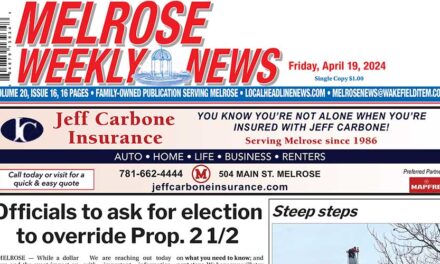Published in the May 5, 2017 edition
By GAIL LOWE
MELROSE — At the end of a performance review, is it legal for a supervisor to ask an employee when he or she plans to retire?
A panel of three professional women responded to this and other work-related questions Thursday evening, April 27, inside the Learning Commons at Melrose High School. The event — “Achieving Equal Pay and What You Need to Know” — was hosted by the Melrose Commission on Women and drew about 25 people.
The discussion was held in response to input from the community regarding topics of particular concern to women during last September’s Victorian Fair and to shed light on the new equal pay law due to take effect on Jan. 1, 2018.
Elizabeth Hart, founder and executive director of Tailored for Success, Inc., moderated the discussion and fielded questions for Kate Donovan, one of the authors of the Massachusetts Equal Pay law signed by Governor Charlie Baker on Aug. 1, 2016; Rebecca Pontikes, an attorney who specializes in employment law and civil rights and Genevieve Nadeau who has served in Attorney General Maura Healey’s office since 2012. She has since been appointed Deputy Division Chief of the Civil Rights Division.
Baker’s new law updates one passed in 1945. The 1945 law was the first in the country to require comparable pay for comparable work.
When the new law goes into effect, employers will be prohibited from requesting salary history during a job interview since hiring female employees and paying them at a rate based on their former earnings only perpetuates the wage gap. A job applicant, however, can voluntarily offer the information.
Workers will also be allowed to discuss salaries among themselves.
According to a Pew Research Center analysis of median hourly earnings of both full- and part-time U.S. workers, the gender gap in pay has narrowed since 1980, particularly among younger workers, but it still persists. In 2015, women earned about 82 percent of what men earned.
Pontikes kicked off the Thursday night discussion, explaining that the Federal and State laws concerning equal pay left a gap. She then mentioned female school cafeteria workers at Everett High School who decades ago asked for a raise but were denied. Management said they were “just women” and needed “pin money” to pay for jewelry and other trivial things.
In 1989, the cafeteria workers sued, arguing that they were earning less than male school custodians, and that the Massachusetts equal pay law was being violated. A ruling in their favor was overturned by the Supreme Judicial Court in 1998 because the positions were not considered comparable and equal pay was not required.
Panel members discussed the new law and said that it puts in place other protections to ensure that women are paid equally for equal work. For instance, employers are now obliged to review job descriptions and categories to ensure they are obeying the law.
Donovan said that when salary is being discussed with potential new hires, employers often “low ball” them due to having to work within a budget.
She also said that head hunters can be helpful to people looking for new jobs and earning a higher salary. As an example, she said that when an accountant earning $50,000 calls a head hunter, he or she is often told they can earn $10,000 more and is asked to send a resume.
Pontikes discussed age discrimination and said that two in every three of her clients are suing because of it. As examples, she cited an 86-year-old professor and a bartender who both believe they are being pushed out of their jobs because of their ages.
Donovan said that when the 2009 Great Recession was in full swing, two percent raises were common.
“Now, the kid coming in is making more than you,” she said, adding that men negotiate their salaries by stating what they need while women only circle around the subject during a job interview.
Nadeau talked about recruitment and retention and said that they are important reasons for employers to review salaries and ask the question, “Am I paying people fairly?”
Other topics included the merit pay system, workplace diversity and salary negotiation.
Pontikes also answered the question concerning an employee’s retirement plans at the end of a performance review. She said that if the question is asked in a conversational way, it might not be illegal. Even so, the employer has been exposed by asking it, she said. Even so, in the event of a lawsuit a plaintiff might not win.
In closing, Hart said that the April 27 event was “just the beginning” for the Melrose Commission on Women’s events. The organization has scheduled two more for May 4 (women’s economic development) and May 11 (negotiation workshop). The events will be held in the Learning Commons at the high school at 7 p.m.
For more information, visit MelroseCommissionOnWomen.eventbrite.com. The public is invited, including residents of neighboring cities and towns.




